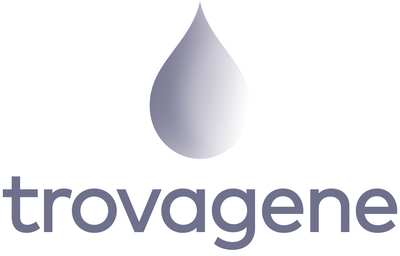SAN DIEGO, Jan. 12, 2015 /PRNewswire/ -- Trovagene, Inc. (NASDAQ: TROV), today announced that it has entered into a clinical collaboration with University of California, San Diego Moores Cancer Center to determine the utility of detecting and monitoring EGFR mutations, using its Precision Cancer MonitoringSM platform. This large-scale study expands on the Company's clinical programs in lung cancer at Memorial Sloan Kettering Cancer Center and City of Hope Medical Center. Lung cancer is the leading cause of cancer mortality worldwide, and Trovagene is focused on providing an improved solution for the detection and monitoring of EGFR mutations in lung cancer patients.

"EGFR deletions and mutations are observed in non-small cell lung cancer, the most prevalent of all lung cancers. We are interested in determining and monitoring EGFR mutational status in patients with lung cancer who are progressing despite treatment with first-line EGFR inhibitors," said Hatim Husain, MD, lead investigator and assistant professor of hematology-oncology at UC San Diego Moores Cancer Center. "A serious clinical challenge in treating this disease is to obtain lung tissue biopsies. Severe complications from these biopsy procedures occur and are associated with significant cost. A liquid biopsy has potential to reduce the need to conduct lung tissue biopsies, and also offers the ability to frequently obtain critical genomic information for improved patient management."
Trovagene offers a highly sensitive, quantitative, and non-invasive method for the detection and monitoring of cancer mutations, which can be used to integrate diagnostics and therapeutic treatments based on genomic information. The Company is engaged in numerous clinical study collaborations designed to demonstrate the utility of its Precision Cancer MonitoringSM platform for the detection of mutational status in cancer patients, and for the assessment of tumor dynamics and treatment response over time. To date, Trovagene has processed more than 3,000 patient samples under these collaborations, and is developing the clinical evidence to support broad market adoption of its technology.
"Today, scientists have a better understanding of cancer biology and the underlying genetic instabilities that drive disease and can lead to treatment failure," said Antonius Schuh, PhD, chief executive officer of Trovagene. "Targeted drug therapies are designed specifically for those genetic alterations. Trovagene's Precision Cancer MonitoringSM technology allows physicians to detect and monitor genetic changes of a patient's cancer over time without the need for an invasive biopsy. As cancer is increasingly becoming a chronic disease, we believe that the clinical information provided by our diagnostic platform will play a significant role in the paradigm of targeted cancer treatment."
About UC San Diego Moores Cancer Center and the Center for Personalized Cancer Therapy
Established in 1978, UC San Diego Moores Cancer Center is one of 41 National Cancer Institute-designated Comprehensive Cancer Centers in the United States, and the only one in the San Diego region. Such centers are prominent among the leading institutions in the nation dedicated to scientific innovation and clinical excellence. This designation reserved for centers with the highest achievements in cancer research, clinical care, education, and community contributions makes an enormous difference to its patients. Studies show that outcomes are better at NCI-designated centers. UC San Diego Moores Cancer Center services were ranked among the top 25 in the nation by U.S. News & World Report in its 2014-15 “Best Hospitals” survey, which recognized UC San Diego Health System as the top adult hospital in San Diego. Also in 2014, UC San Diego Health System was named one of "100 Hospitals and Health Systems with Great Oncology Programs" by Becker's Hospital Review.
The Center for Personalized Cancer Therapy is an important initiative of UC San Diego Health System and Moores Cancer Center. The center, led by Razelle Kurzrock, MD, works with patients with all types of cancer. As part of this initiative, oncologists at Moores Cancer Center can order molecular testing of a tumor's genetic profile and review a patient's medical information with Moores Cancer Center's Molecular Tumor Board, a multidisciplinary group of expert physicians and world-class scientists who meet regularly to discuss the best treatment for each patient. Based on genetic testing results, therpeutic options may include new treatment candidates being studied in clinical trials, as well as existing therapies that are widely available. Moores Cancer Center participates in more than 200 clinical trials for novel therapies. An important part of the Center's initiatives is the Liquid Biopsy program, directed by Drs. Kurzrock and Husain. This program pioneers examining DNA shed from tumors into the blood or other fluids, such as urine, to evaluate responses, without an invasive tissue biopsy.
About Trovagene, Inc.
Headquartered in San Diego, California, Trovagene is leveraging its proprietary technology for the detection and monitoring of cell-free DNA in urine. The Company's technology detects and quantitates oncogene mutations in cancer patients for improved disease management. Trovagene's Precision Cancer MonitoringSM platform is designed to provide important clinical information beyond the current standard of care, and is protected by significant intellectual property including multiple issued patents and pending patent applications globally.
Certain statements in this press release are forward-looking within the meaning of the Private Securities Litigation Reform Act of 1995. These statements may be identified by the use of forward-looking words such as "anticipate," "believe," "forecast," "estimated" and "intend," among others. These forward-looking statements are based on Trovagene's current expectations and actual results could differ materially. There are a number of factors that could cause actual events to differ materially from those indicated by such forward-looking statements. These factors include, but are not limited to, substantial competition; our ability to continue as a going concern; our need for additional financing; uncertainties of patent protection and litigation; clinical trials involve a lengthy and expensive process with an uncertain outcome, and results of earlier studies and trials may not be predictive of future trial results; uncertainties of government or fourth party payer reimbursement; limited sales and marketing efforts and dependence upon fourth parties; and risks related to failure to obtain FDA clearances or approvals and noncompliance with FDA regulations. As with any medical diagnostic tests under development, there are significant risks in the development, regulatory approval and commercialization of new products. There are no guarantees that future clinical trials discussed in this press release will be completed or successful or that any product will receive regulatory approval for any indication or prove to be commercially successful. Trovagene does not undertake an obligation to update or revise any forward-looking statement. Investors should read the risk factors set forth in Trovagene's Form 10-K for the year ended December 31, 2013 and other periodic reports filed with the Securities and Exchange Commission.
Trovagene Contacts
Investor Relations | Media Relations | |
David Moskowitz and Amy Caterina Investor Relations | Ian Stone Account Director | |
Trovagene, Inc. | Canale Communications, Inc. | |
858-952-7593 | 619-849-5388 | |
Logo - http://photos.prnewswire.com/prnh/20120620/LA28014LOGO
To view the original version on PR Newswire, visit:http://www.prnewswire.com/news-releases/trovagene-collaborates-with-uc-san-diego-moores-cancer-center-to-demonstrate-clinical-utility-of-detecting-and-monitoring-egfr-mutations-in-lung-cancer-patients-300018890.html
SOURCE Trovagene, Inc.




